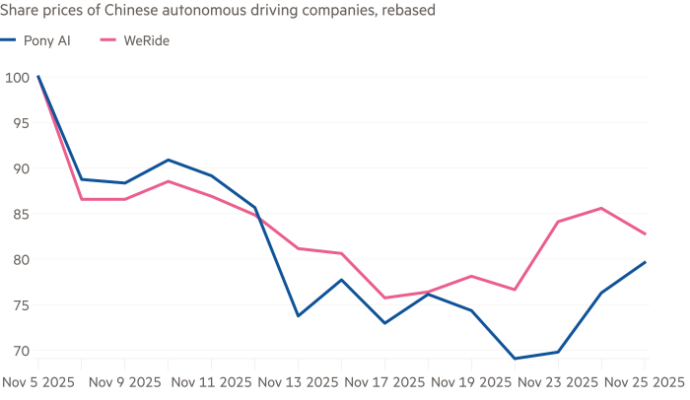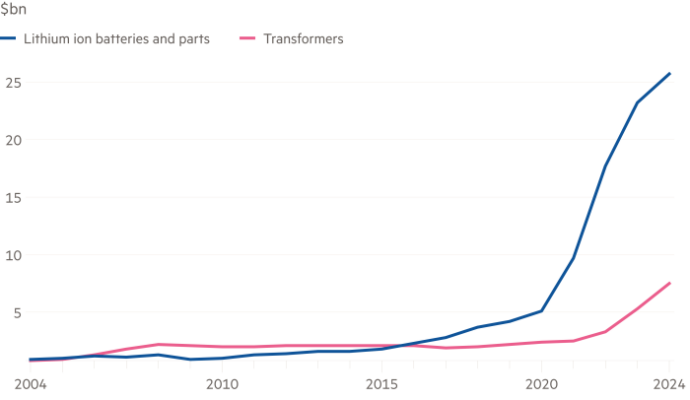Hello and welcome to Working It.
We had a great launch event for the FT Wellbeing employee group, where I talked about the rise of big emotions at work 😳, and how managers can help, while my colleague Claer Barrett gave advice on improving financial wellbeing. Those of us who work at the FT are lucky to have Claer on hand, but her wisdom is also available via her award-winning newsletter series: Sort Your Financial Life Out.
As Claer pointed out, we often overlook financial benefits at work, and so lose out on free money. (I certainly lost out on the FT’s £150 subsidy towards glasses for computer work 🤦🏼♀️.)
Read on for expert insight into workplace trends that started in China, which are fascinating (and perhaps relevant to?) the rest of the world.
PS: I had no time to write Office Therapy this week, I am afraid, because I had to manage a crisis at home. Let’s just say this: London’s fruity e-bikes are a mixed blessing 🫣🚲.
As always, email about anything that bothers you/cool stuff/why AI is or is not going to take our jobs by 2027 👀: isabel.berwick@ft.com

China’s work culture terms go global
You may be familiar with the Chinese-language phenomenon, tang ping, or lying flat, which refers to workers who are exhausted and stop trying so hard. It started to be talked about widely in 2021 during the pandemic, and has something in common with the later TikTok phenomenon of “quiet quitting”: valuing your own time and not trying too hard at work 🛀🏿.
More recently, we’ve learned more about the “always-on” workplace culture in China via terms such as “996”, for working from 9am to 9pm six days a week, and even “007”, meaning no days off. But what caught my eye recently was a word used in an FT analysis of the brutal job market for UK graduates from someone who has applied for more than 100 jobs:
“There is a Chinese term, neijuan — it means, no matter how hard you try, no matter how hard you work, success is impossible . . . Neijuan perfectly sums up my life and those of my peers.”
I hadn’t heard of neijuan, so I talked to Professor Chris Rowley, an expert on business and management in Asia, after he wrote a letter to the FT about the article. In it, Chris suggested that the comparison wasn’t right, as “the UK context is very different and less stark compared to China”. A fuller definition of neijuan, as Chris wrote, is “a situation where ever-increasing inputs produce no improvements, a societal phenomenon where intense competition drives individuals to increase their efforts in a self-defeating cycle, leading to no real progress. Thus, no matter how hard someone works, progress is impossible. This leads to demotivation and disengagement and even ‘opting out’ altogether.”
Chris, who teaches at Kellogg College, Oxford and Bayes Business School, City St George’s, University of London, said graduates in Europe and the US have not faced the same pressure and competition to get into prestigious schools and universities that builds from an early age in Asia. “On my very first trip to Korea, for example, in the early 90s, my colleague was taking his children from school to their after-school, and then picked them up at 10pm. Even small children do this.”
While neijuan may not be a direct parallel with the UK, it’s clearly relatable at a time of scarcity for job seekers, overwhelm and wage stagnation for those who are in work. Chris then told me about another movement among young people in China that goes beyond neijuan into a total rejection of adult life: “Some people become what’s called “a full-time child”, where they have just opted out altogether because they can’t get a job. So they go back to their parents and they do jobs around the house . . . so they’ll do the shopping, the washing, the cleaning🧽.”
This “full-time child” phenomenon is not the same as the “shut-in” lifestyle we know by its Japanese name, hikikomori, in which young men cut themselves off from society and stay in their rooms. Instead, “full-time child” is a reversion to a time before the young person’s dreams were shattered. “This is basically when you can’t get a job, despite the childhood dream. So you go back to your parents’, but you don’t just lie around,” Chris told me.
It seems almost flippant to compare the “full-time child” phenomenon to the (imminent) return home of 2025 UK university leavers who can’t get graduate-level jobs 🎓, who will be joining many others from previous cohorts that live with their families and work, often, in hospitality jobs. Nevertheless, I can see the parallels.
*Does your country have a workplace or cultural term that others should know about? We’d love to hear about it: isabel.berwick@ft.com.
Five top stories from the world of work
M&S blames ‘human error’ for cyber attack that will hit profit by £300mn: If you think you’ve had a bad week, think again. More details are emerging about the attack on M&S: it came via staff at a third-party supplier who changed passwords and authentication processes and let the criminals in. By Laura Onita.
Stricter US border controls prompt business travel rethink: Anjli Raval reports on the measures that some academics and business people are deploying when travelling to the US, including burner phones and removing data from computers.
Stumped by generational jargon? Try a corporate translator. Gen Z are turning to online creators and AI to help them write formal emails and get their messages across in a way that’s palatable to older managers, writes Olivia Surguy.
What management theory tells us about Trump’s team of rivals: Leadership experts talk to Andrew Hill about Donald Trump’s management style, including some explanations of the “groupthink” on display among his cabinet.
What makes a positive difference to the way staff feel about work? Good managers, that’s what. I wrote for the FT’s Europe’s Best Employers 2025 supplement on one of my favourite subjects.
One more thing . . .
For an antidote to gloom, bookmark The Ballad of Wallis Island, a film that’s already out in the US and opens in UK cinemas later this month. It’s properly, laugh-out-loud funny (although by the end you may be crying, in a good way 🥹). Tim Key and Tom Basden write and star, with Carey Mulligan as Nell, former musical and life partner of Basden’s Herb. The folk duo reunite to play a one-off gig for an eccentric superfan (Key) living on a remote island.
US workplace insights from Charter: AI agents (yes, them again 🕵🏻♀️)
Last week, I talked about the rise of AI agents. Recap: agents are being talked about, and up, nonstop — even though it’s not clear how many people know what they are 👀.
As a follow-up, I asked my go-to workplace expert, Kevin Delaney, editor-in-chief of Charter, the future of work and media research company, to blast through the tangles of surveys and bullet-point laden LinkedIn posts and give it to Working It readers straight: what does he think about agentic AI? Is it coming for our jobs?
“It’s hard to imagine that AI doesn’t reshape the jobs of millions of white-collar workers, and AI agents are likely an accelerant of that, since they can complete tasks autonomously. In many areas, this has the potential to reduce the quantity and quality of jobs. The promised creation of new roles and less workplace drudgery is a hopeful, if less certain, forecast.
AI agents will reduce the inconveniences of many areas of the workplace. Many small tasks that require our focus and co-ordination — such as scheduling meetings or getting information from another part of a company — can be handled by AI agents.
Agents can also perform many of the tasks that constitute roles within companies. US executives tell me that they’re asking their teams to determine whether a job can be done by AI before hiring a human for any open jobs. The increased capabilities that AI agents represent will surely increase the frequency with which hiring managers come back and say, no, we don’t need to hire a person.
Tech optimists predict that, even as jobs go away in this manner, the greater efficiency and economic activity generated thanks to AI will lead to the creation of new jobs, and the net impact on employment will be positive. That may be true in the longer term, but for the coming months and years, it’s easier to see how AI agents will replace human work.”
A view from the Working It community 📷
This week’s snapshot of working life comes from Andrew Hewitt, who says: “Here is the view from my office at Manchester Metropolitan University where I am CFO. On the right is the original Manchester School of Art. To its left is the new Grosvenor East Building. In the foreground is our newly refurbished public realm. Not bad for an inner city campus.” Agreed 👍.
Andrew will receive a “lucky dip” of new workplace, productivity and management books. Do send in the view from your desk (or rooftop terrace): isabel.berwick@ft.com. It doesn’t even have to be sunny.

And finally . . .
A shout-out to Career Returners, an organisation working with employers and would-be returners to get more people (all right, women 👩🏽💻) back into good jobs after career breaks. Its Career Returners Indicator 2025 is out now, a great resource for any company building a returners’ programme.
It’s a tough market, but employers can help by removing recruitment bias ✅. Sample tip: “Check that your automated or manual application process is NOT screening out candidates just because of their CV gap: 2021 Harvard Business School research in the UK, the US and Germany found 43-48 per cent of ATS systems filter out gaps over six months.” 😱


